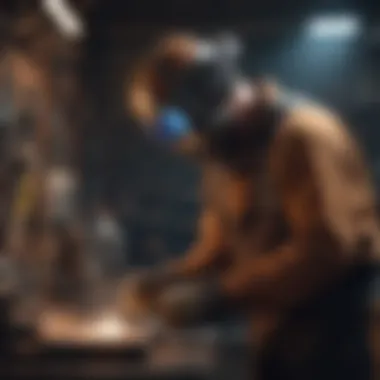Union Welding Jobs in Illinois: Opportunities and Insights


Intro
Topic Overview
Definition and Importance
Union welding jobs refer to positions that are held by welders who are members of a labor union. These positions are significant as they generally offer better wages, benefits, and job security when compared to non-union roles. The union not only provides support in negotiations but also ensures that members are protected under labor laws and workplace guidelines.
Brief History and Evolution
The history of welding unions is deeply rooted in the labor movement of the early 20th century. Initially, welders worked in challenging conditions without much protection or support. Over time, as industries grew, the unions emerged to protect workers’ interests. In Illinois, the welding union landscape has evolved substantially, adapting to changes in technology and market demands. It is crucial to recognize how unions have influenced the working conditions and pay scales for welders while meeting the evolving needs of the industries they serve.
Key Techniques and Innovations
Sustainable Union Practices
Unions advocating for welding jobs often emphasize sustainable practices. This includes not only environmentally friendly methods in welding but also procedures to keep workers safe during operations. For instance, enhanced training programs focus on modern welding technologies that promote sustainability.
Advances in Welding Technologies
The field of welding is also undergoing transformation due to technological advancements. New methods like robotic welding have gained prevalence. These innovations help improve efficiency and precision, allowing welders to adapt to the demands of contemporary manufacturing processes.
Practical Applications
Step-by-Step Career Path
- Education: Obtaining a high school diploma or GED is the first step.
- Training: Enroll in a welding program or apprenticeship through a union.
- Certification: Achieve certification to validate skills in specific welding processes.
- Union Membership: Apply for membership in a relevant union, such as the United Association of Journeymen and Apprentices of the Plumbing and Pipe Fitting Industry.
- Job Placement: Utilize union resources to find welding jobs in Illinois.
Case Studies of Successful Welders
Real-world examples can be motivating. Many welders enrolled in unions have progressed from apprentices to senior skilled positions, thanks to union training and support. Stories of individuals who have secured stable employment with benefits after joining a union illustrate the advantages unions provide in navigating the job market.
"Joining a union changed my life. I went from unsure part-time work to a full-time job with solid benefits." – A union welder from Illinois.
Learning more about union welding jobs can provide essential insights into not just earning potential but also long-term career satisfaction. As wages and working conditions improve for welding professionals, understanding these dynamics becomes both beneficial and necessary for any aspiring welder.
Union welding jobs play a critical role in Illinois, a state known for its diverse industrial base. Understanding the landscape of these jobs is vitally important for both aspiring welders and industry stakeholders. This overview can help potential candidates navigate the intricacies of unionized environments, while also shedding light on the labor dynamics present in the welding sector.
Union welding jobs represent a commitment to quality, safety, and fair labor practices. They ensure that those engaged in welding work enjoy not only competitive wages but also benefits and job security that often surpass non-union roles. The significance of unions lies in their ability to advocate for workers, negotiate better pay, and provide a structured framework for workplace standards, which directly impacts job satisfaction and retention.
Definition and Importance of Union Welding
Union welding refers to a segment of the welding workforce that operates under the umbrella of a labor union. These unions represent the interests of welders, negotiating contracts that stipulate wages, working conditions, and benefits such as health insurance and retirement plans. This collective bargaining power is essential for maintaining standards in the industry and protecting welders from exploitation.
Moreover, union welding promotes a culture of safety and skill development. Organizations like the United Brotherhood of Carpenters and Joiners of America offer training and apprenticeship programs tailored to not just teach the fundamentals, but also advanced techniques and safety protocols. This investment in education is paramount for maintaining high-quality workmanship within the industry.
Historical Context of Welding in Illinois
In the post-World War II era, the demand for experienced welders soared as manufacturing companies aimed to rebuild and expand. During this time, unions gained prominence, advocating for worker rights and better working conditions. Unions played a pivotal role in establishing safety guidelines that are now standard practice in the welding industry.
Today, Illinois continues to honor its legacy as a manufacturing hub, and the welding workforce remains central to its economic fabric. The ongoing challenges and opportunities facing union welding jobs today are a direct reflection of the historical developments that have shaped the industry.
Qualifications Required for Union Welding Jobs


The field of union welding in Illinois imposes specific qualificatins that are essential for candidates. Understanding these requirements is crucial for aspiring welders to ensure they meet the standards set by unions and employers. Welding work demands a combination of technical knowledge, hands-on skills, and personal attributes to succeed in this demanding industry. Here, we will examine the main qualifications needed for union welding jobs, focusing on the educational background, necessary certifications and licenses, and the physical requirements and skills needed for the job.
Educational Background
A solid educational foundation is important for anyone pursuing a welding career. Most positions require at least a high school diploma or GED. Beyond that, many employers prefer candidates who have completed a formal welding program. Programs can often be found at various community colleges or technical schools throughout Illinois. These courses typically cover welding techniques, safety protocols, and equipment operation. Also, potential welders should familiarize themselves with reading technical drawings and blueprints.
In addition to formal education, ongoing learning is essential. Many union apprenticeships involve advanced training to maintain current skills and adapt to new technologies. This commitment to continuous education is key in an industry that is rapidly changing.
Certifications and Licenses
Certifications play a major role in distinguishing welders in the job market. The American Welding Society (AWS) offers various certifications that can enhance a welder's employability. Obtaining an AWS certification management shows a strong commitment to quality and adherence to industry standards. Among the certifications offered, the Certified Welder (CW) program is widely recognized.
Additionally, for certain welding jobs, state or local licenses may be required. It is important for welders to check the licensure requirements in Illinois. Securing necessary credentials can often lead to better job prospects and higher wages.
"Certifications are more than just a piece of paper; they often translate to job opportunities and better pay, reinforcing a welder's professional credibility."
Physical Requirements and Skills
Welding is a physically demanding profession. Candidates should be able to perform tasks that require significant strength and stamina. This means being capable of lifting heavy materials, standing or kneeling for extended periods, and performing precise manual work.
Moreover, good hand-eye coordination and attention to detail are critical. Welders must ensure precision when joining materials together. Safety awareness is another critical skill, as welders work in environments that may involve hazardous materials and equipment. Understanding and practicing safety protocols are vital to preventing accidents and ensuring a safe work environment.
Benefits of Union Membership for Welders
Union membership offers significant advantages for welders in Illinois. These benefits extend beyond merely securing a job. They provide essential support, resources, and a structure that empowers welders in their careers. The prominence of union membership stems from its ability to advocate for workers’ rights, often resulting in better livelihoods for members. Below, we explore key aspects of these benefits.
Job Security and Stability
One of the most compelling reasons welders join unions is the increased job security and stability they provide. Unions negotiate contracts that typically include protection against unjust dismissal and layoff policies. They ensure that the processes related to job continuity are transparent and fair. This security encourages skilled welders to invest in their roles and focus on long-term career growth.
Additionally, in unstable economic conditions, unions can offer a buffer. They can lobby for policies that protect jobs within the industry. This collective bargaining power is greatly beneficial, especially where market demands fluctuate.
Competitive Wages and Benefits
Welders within unions often benefit from competitive wages compared to non-union counterparts. Through collective bargaining, unions set industry standards for pay scales, which are usually higher due to the strength in numbers. This competitive edge is vital for attracting skilled welders to join the ranks. Moreover, unions often secure additional benefits like health insurance, retirement plans, and paid leave.
Members are less likely to face wage exploitation. Unions work tirelessly to adjust wage scales based on inflation and industry growth, ensuring that welders are compensated justly. Such financial security allows welders to focus on their craft without the constant pressure of financial uncertainty.
Training and Development Opportunities
Without a doubt, training and development are paramount in the welding fields. Unions often provide resources for continuous education and skills enhancement. Various apprenticeship programs are available, offering hands-on training and mentorship. These programs ensure that members stay up-to-date with the latest technologies and techniques in welding.
Furthermore, many unions have partnerships with community colleges and technical schools to offer specialized training. This collaboration benefits welders, providing easy access to advanced educational opportunities. With these training programs, welders can adapt to evolving industry demands, increasing their marketability.
"Joining a union can transform the career of a welder, equipping them with tools for both personal and professional growth."
Types of Union Welding Jobs Available
Understanding the various types of union welding jobs available is crucial for anyone considering a career in this field. It serves not just as an insight into job opportunities, but also sheds light on the specific skills and training required for each type. In Illinois, the demand for skilled welders spans several industries, reflecting a robust market for those enthusiastic about craftsmanship and technical work.
Construction and Structural Welding
Construction and structural welding encompasses the assembly and fabrication of large structures. This type of welding often takes place on construction sites, involving work with materials like steel and aluminum. Welders in this sector are responsible for joining components together, ensuring stability and safety of buildings and bridges.


Key aspects of construction welding include:
- Precision and Accuracy: It requires welders to follow blueprints meticulously, ensuring that each weld meets the specifications.
- Safety Awareness: Working at height or with heavy equipment demands a high level of safety consciousness, as the risks associated can be significant.
- Team Collaboration: Often, welders must work closely with other trades, making communication skills essential.
Given the ongoing infrastructural projects in Illinois, the need for skilled welders in construction is expected to grow.
Manufacturing and Production Welding
Manufacturing and production welding refers to the fabrication of metal products in a controlled environment, typically within factories. In this setting, welders play a key role in the production line, often performing repetitive tasks that require a steady hand and a keen eye.
This type of welding focuses on:
- Efficiency and Speed: Production welders must work quickly while maintaining quality, as deadlines are often strict.
- Expertise in Techniques: Familiarity with various welding techniques such as MIG, TIG, and Stick welding is essential.
- Quality Control: Welders are responsible for inspecting their work for any defects, ensuring that only high-quality products leave the facility.
The manufacturing sector remains a powerhouse for job opportunities due to advancements in technology and production methodologies.
Repair and Maintenance Welding
Repair and maintenance welding plays a crucial role in extending the life of equipment and structures. This job often requires welders to assess damage and determine the best method for repairs. It can include anything from welding pipes in refineries to fixing metal components in agricultural machinery.
Among the responsibilities in this area are:
- Problem-Solving Skills: Welders must diagnose issues effectively and come up with appropriate solutions.
- Versatility: The ability to work on different types of equipment and materials is vital.
- Attention to Detail: Precision is key since a poor repair can lead to further issues or safety hazards.
Overall, there is a steady demand for repair and maintenance welders in Illinois, as businesses seek to minimize downtimes and optimize operations.
Job Market Analysis for Welders in Illinois
Analyzing the job market for welders in Illinois is crucial for understanding the broader landscape of employment opportunities available. Welders play an essential role across various industries, particularly in construction, manufacturing, and repair. This section outlines the current demand for welders and examines industry trends to provide a more comprehensive picture for potential candidates and industry stakeholders.
Current Demand for Welders
The demand for welders in Illinois varies significantly according to economic conditions and industry needs. As of the latest reports, there is a growing need for skilled welders in both construction and manufacturing sectors. Several factors contribute to this demand:
- Infrastructure Projects: Government initiatives aimed at improving infrastructure create new job openings.
- Manufacturing Growth: The resurgence of manufacturing in the U.S. means increased production lines and necessitates more skilled welders.
- Aging Workforce: Many experienced welders are retiring, resulting in a skills gap that younger welders can fill.
Statistics indicate that the employment of welders is projected to grow over the next decade, primarily due to these factors. This growth indicates a favorable scenario for new entrants in the welding field, especially those affiliated with unions.
Industry Trends and Predictions
The welding industry in Illinois is subject to various trends that shape the employment landscape for welders:
- Technological Integration: Advancements in welding technology, such as robotics and automation, have led to increased efficiency but also require welders to adapt to new tools and methods.
- Sustainability Practices: An emphasis on sustainable practices is changing the way welding jobs are approached. Welders may need to be versed in environmentally friendly techniques and materials.
- Increased Training Opportunities: As the demand for skilled labor rises, more educational institutions and unions are offering training programs to prepare a capable workforce.
Overall, the outlook for welders in Illinois appears positive, but staying informed on trends is crucial for success."
"Welders are at the forefront of innovation in the manufacturing sector, and those who embrace new technologies will have a competitive edge."
Understanding the job market through these lenses helps aspiring welders make informed decisions about their career paths. The need for skilled welders continues to grow, presenting significant opportunities for those willing to invest time and effort into their training and professional development.
Training Programs and Resources
Training programs and resources are essential pillars in the pursuit of a career in union welding. They provide aspiring welders with the necessary knowledge and skills to excel in the field, ensuring they meet the rigorous demands of the industry. This section will delve into the most significant training opportunities, particularly union apprenticeship programs and community colleges, that help prepare individuals for successful careers in welding.


Union Apprenticeship Programs
Union apprenticeship programs serve as a robust foundation for many welding careers. These programs combine hands-on training with classroom instruction, fostering both practical experience and theoretical knowledge. Apprentices often work under the supervision of experienced welders, gaining insights into various welding techniques and safety protocols.
Benefits of these programs include:
- Structured Learning: Apprenticeships often have a defined curriculum, which ensures all essential topics are covered.
- Earning While Learning: Participants earn a wage during their apprenticeship, which can help them financially while they learn.
- Job Placement Opportunities: Unions tend to have strong industry connections, facilitating job placement upon completion of the program.
To be accepted into a union apprenticeship program, candidates typically need a high school diploma or equivalent, along with a strong interest in the welding trade. Individuals should also be prepared to pass an aptitude test or interview, demonstrating their commitment to pursuing a welding career.
Community Colleges and Technical Schools
Community colleges and technical schools play a vital role in providing foundational skills and expertise to aspiring welders. Many institutions offer specialized welding programs that cater to various industry needs, supported by experienced instructors and well-equipped facilities.
Some key considerations for community college and technical school programs include:
- Diverse Course Offerings: Programs may include specialized courses, such as MIG, TIG, and stick welding, catering to different industry requirements.
- Flexible Scheduling: Many institutions offer evening and weekend classes, making it easier for individuals who may be working to improve their skills.
- Accreditation and Industry Recognition: Enrolling in an accredited program ensures that the training received meets established industry standards, which is crucial for employability.
"Investing in proper training is key for a successful career in welding; it opens doors and lays a strong foundation for future growth.”
For further exploration of the welding programs available, resources like Wikipedia and Britannica can provide valuable information.
Challenges in the Union Welding Sector
The landscape of union welding in Illinois faces a number of challenges that need careful consideration. Understanding these challenges is crucial for both aspiring welders and industry stakeholders alike. It gives insights into the dynamics that influence job stability, wage structures, and overall employment in this sector. Despite the advantages of union membership, such as collective bargaining, the sector encounters obstacles that must be addressed to ensure its continued growth and resilience.
Economic Factors Affecting Employment
Economic conditions play a significant role in shaping employment opportunities for welders. The job market can be influenced by various factors, including supply and demand dynamics, inflation rates, and local industrial growth. For instance, a downturn in the economy might lead to less construction and manufacturing work, directly impacting welding jobs. When companies face budget constraints, they may reduce their workforce or delay hiring new employees. This situation can be particularly challenging for union members who rely on collective agreements for job security.
Moreover, fluctuations in raw material costs can also affect welding jobs. When steel and other foundational materials increase in price, construction projects may become less feasible, which in turn affects the demand for welders. A decline in major industries, such as automotive or construction, can lead to significant job losses.
Technological Advancements and Their Impact
Technology is evolving at a rapid pace, and the welding industry is no exception. While advancements can lead to greater efficiency and improved safety, they also pose challenges for current welders in unions. Automated and robotic welding technology, for example, can replace tasks traditionally performed by skilled welders. As companies adopt these technologies, there may be less demand for manual welding, particularly in processes that can be standardized.
Welders must adapt to new tools and techniques. This means continuous education and training are necessary to keep skills relevant. In this context, unions play a critical role by offering training programs that help members transition into new roles or enhance existing skills. However, not all welders may have equal access to these opportunities.
Future Outlook for Union Welding in Illinois
Emerging Opportunities
As industries continue to innovate, new avenues for welding jobs are becoming apparent. For instance, the renewable energy sector is growing. This shift toward sustainable energy sources has increased the need for welding in constructing solar panels and wind turbines. In addition, the infrastructure sector is projected to receive significant investments, leading to a potential increase in construction and structural welding jobs. The demand in these areas creates pathways for skilled welders to find stable employment.
- Renewable Energy: Opportunities are increasing in solar and wind industries.
- Infrastructure: Investments in roads, bridges, and public transport systems are raising the need for welding skills.
- Advanced Manufacturing: Innovations in manufacturing processes often involve the need for skilled welders, especially in automation technology.
This environment offers enhanced prospects for welders to advance their careers, earn competitive salaries, and work in diverse fields.
The Role of Unions in Supporting Welders
Unions play a crucial role in safeguarding the interests of welders. They ensure fair wages, safe working environments, and access to reputable training programs. The presence of strong unions helps in negotiating contracts that benefit workers, leading to job security and better benefits.
Unions also provide resources for continuous education and skills training. This not only helps welders stay relevant in their field but also prepares them for emerging technologies. As the industry changes, so does the need for welders to adapt and upgrade their skills.
Benefits of Union Support:
- Collective Bargaining: Unions negotiate better pay and working conditions.
- Job Security: Union members often enjoy greater job protection.
- Training Access: Unions offer programs for ongoing education and skill enhancement.
"A strong union can be a lifeline for skilled trades like welding, ensuring a stable future for workers and upholding the integrity of the profession."



